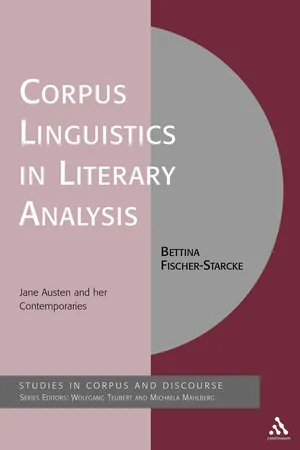
Corpus Linguistics in Literary Analysis
Jane Austen and her Contemporaries
- 240 pages
- English
- PDF
- Available on iOS & Android
About This Book
Corpus Linguistics and The Study of Literature provides a theoretical introduction to corpus stylistics and also demonstrates its application by presenting corpus stylistic analyses of literary texts and corpora. The first part of the book addresses theoretical issues such as the relationship between subjectivity and objectivity in corpus linguistic analyses, criteria for the evaluation of results from corpus linguistic analyses and also discusses units of meaning in language. The second part of the book takes this theory and applies it to Northanger Abbey by Jane Austen and to two corpora consisting of: Austen's six novels; and texts that are contemporary with Austen. The analyses demonstrate the impact of various features of text on literary meanings and how corpus tools can extract new critical angles. This book will be a key read for upper level undergraduates and postgraduates working in corpus linguistics and in stylistics on linguistics and language studies courses. The editorial board includes: Paul Baker (Lancaster), Frantisek Cermak (Prague), Susan Conrad (Portland), Geoffrey Leech (Lancaster), Dominique Maingueneau (Paris XII), Christian Mair (Freiburg), Alan Partington (Bologna), Elena Tognini-Bonelli (Siena and TWC), Ruth Wodak (Lancaster), and Feng Zhiwei (Beijing). The Corpus and Discourse series consists of two strands. The first, Research in Corpus and Discourse, features innovative contributions to various aspects of corpus linguistics and a wide range of applications, from language technology via the teaching of a second language to a history of mentalities. The second strand, Studies in Corpus and Discourse, is comprised of key texts bridging the gap between social studies and linguistics. Although equally academically rigorous, this strand will be aimed at a wider audience of academics and postgraduate students working in both disciplines.
Frequently asked questions
Information
Table of contents
- Contents
- List of Tables
- List of Figures
- Preface
- 1 Introduction
- 2 Goals, techniques, principles
- 3 Language and meaning
- 4 Summary of Northanger Abbey
- 5 Keywords and concordance lines
- 6 Phraseology
- 7 Text segmentation
- 8 Conclusion
- Appendix
- Notes
- References
- Index of Names
- Index of Subjects